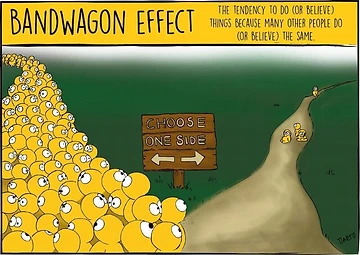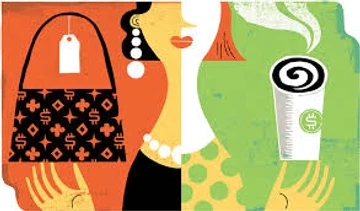Since people started attaching greater significance to luxury products as a means of defining ourselves, the ‘want’ to acquire these naturally magnified and generated desire among individuals. The ‘Bandwagon Effect’ is a psychological phenomenon wherein people indulge in an act as a symbol of social acceptance, regardless of their own belief. As a result, conformism is promoted and snob value is highlighted in society.

The artificial need has evolved through hype produced by advertising and social media. Advertisements often misrepresent a product and create unrealistic expectations for consumers. Instead of selling the product itself, luxury companies market the experience that consumers are supposed to feel with this product. Marketing agencies use the psychological principle of mental conditioning through repetition to generated desire. This is often alleviated by hiring influential and affluent celebrities to portray the use of products as a necessary part of their daily life, and hence we derive meaning through the product’s association with the celebrity. Therefore, there has been a visible shift from catering to the consumer needs during production to manipulation of the same consumers into desiring the product that is being marketed.
Apart from helping advertising agencies mint a fortune, the companies end up making supernormal profits due to exorbitant price tags in the market attributed to its hype and exclusivity. And these are few of the only firms that remain nearly unaffected by recession, hence making them the ultimate winner.
Most of us have indulged in conspicuous consumption sometime or the other. This kind of behavior highlights income inequality in the society and leads to aggressive ostentation, a type of anti-social behavior. People go on demanding more and more luxurious products, competing with the other individuals doing the same thing. This leads to a vicious cycle of trying to reduce the esteem and social status of the next person. The lower and middle class try to adopt the same lifestyle as the upper class despite the unaffordability of such a lifestyle. This practice in turn raises the debt of its maintenance. This has also led to the creation of an alternate, illegal market for duplicate products. Apart from this, the resource count is decreasing due to our ever-growing demand and rise in consumerism, especially in the fashion industry.

Consumerism has contributed greatly to global warming as consumption—in all forms—is responsible for up to 60% of global greenhouse gas emissions. In addition, 80% of resources are consumed by only 16% of the global population. It is imperative for this generation to make a deliberate effort in shifting from materialism and conspicuous consumption to minimalism and conscious consumption. The depletion of resources along with increasing technical advancements that we witness each day has led to numerous theories about the post-consumerism era and emphasizes on the rethinking our commitment towards the planet, because this era of post-consumerism is closer than we think.

Harnoor Kaur
Chief Executive AdvisorHarnoor is an exceptional individual F&IC Hindu is lucky to have.
She joined the club in 2018, and has served as the
Associate Editor of DIVIDE in the past.

